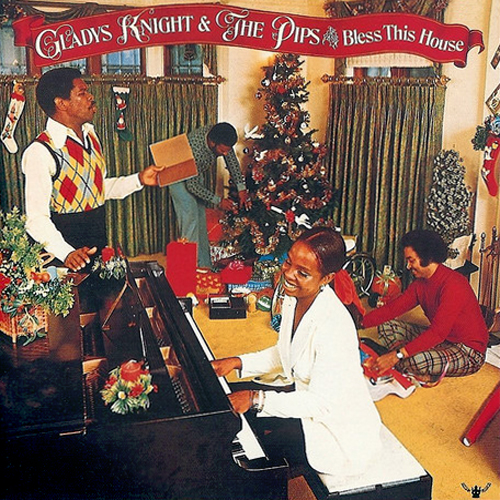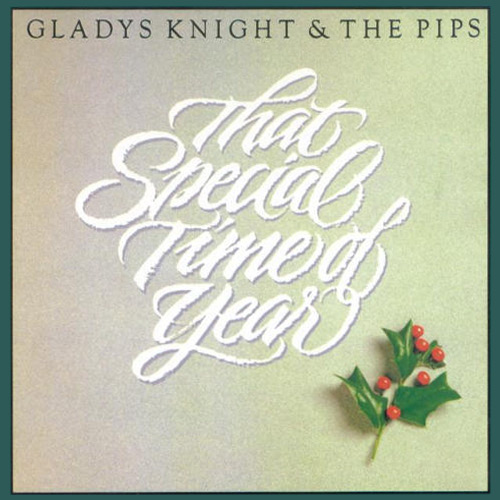
Gladys Knight & The Pips
rhythm & blues
Support www.hipchristmas.com! ![]() Shop at
Amazon,
Apple Music, and more...
Shop at
Amazon,
Apple Music, and more...
 Gladys
Knight and her band of light-footed merry men cut not one but two Christmas
records. Bless
This House (Buddah, 1975) gets the nod over the disco-tinged That
Special Time Of Year (Columbia, 1982) if only because it's a little truer to
the group's roots in gospel and rhythm & blues. But while both records have
fine moments, neither rises to the standard of The
Pips' classic Motown and Buddah recordings - songs as great as "Daddy
Could Swear," "If I Were Your Woman," and "Midnight Train To
Georgia." That's a high standard, for sure, and, in retrospect, the Pips were
past their prime by the time they recorded Bless
This House (Buddah, 1975). Nevertheless, the record fails due to an overdeveloped
sense of decorum rather than any loss of talent or will. Classic rhythm & blues
- and even gospel music - is defined more by joy than reverence, and what we have
here is a failure to celebrate. Gladys Knight is in fine voice, but the peppy funk
and gritty soul that characterize the Pips' best music simply isn't evident.
Gladys
Knight and her band of light-footed merry men cut not one but two Christmas
records. Bless
This House (Buddah, 1975) gets the nod over the disco-tinged That
Special Time Of Year (Columbia, 1982) if only because it's a little truer to
the group's roots in gospel and rhythm & blues. But while both records have
fine moments, neither rises to the standard of The
Pips' classic Motown and Buddah recordings - songs as great as "Daddy
Could Swear," "If I Were Your Woman," and "Midnight Train To
Georgia." That's a high standard, for sure, and, in retrospect, the Pips were
past their prime by the time they recorded Bless
This House (Buddah, 1975). Nevertheless, the record fails due to an overdeveloped
sense of decorum rather than any loss of talent or will. Classic rhythm & blues
- and even gospel music - is defined more by joy than reverence, and what we have
here is a failure to celebrate. Gladys Knight is in fine voice, but the peppy funk
and gritty soul that characterize the Pips' best music simply isn't evident.
That said, Bless This House has some very warm, convivial, revealing moments sure to thrill fans of the group. "Do You Hear What I Hear?" and "Silent Night" had been released as the a- and b-sides of a 1974 single and, not coincidentally, those are the best two songs on the album. The original Buddah LP (pictured above) has never been reissued precisely on CD. However, the album is widely available in a budget package known simply as The Christmas Album. Issued through BMG Special Products, The Christmas Album is a no frills, somewhat bowdlerized, otherwise serviceable reissue.
 Buddah
Records later went belly up and, after some legal wrangling, the Pips landed on
Columbia where they scored their biggest hit in years, "Landlord" (1980). That
Special Time Of Year (Columbia, 1982) was released in the wake of this success
and, in certain ways, is a better record than its predecessor - spirited and confident
where Bless
This House was reserved and tenuous. Despite this, I prefer the earlier album
because That
Special Time Of Year moved the Pips yet another step further away from their
roots, another step towards the smooth professionalism that would ultimately kill
soul music. Still, the record is a marvelous showcase for Knight's rich voice,
alternating between gorgeous interpretations of standards like "What Are You
Doing New Year's Eve?" and tasteful disco workouts such as the giddy title
track. Johnny Mathis duets on a few cuts including "When A Child Is Born," an
endearing religious ballad and perennial radio favorite. That
Special Time Of Year has been reissued on CD, though it can be tough to find.
Buddah
Records later went belly up and, after some legal wrangling, the Pips landed on
Columbia where they scored their biggest hit in years, "Landlord" (1980). That
Special Time Of Year (Columbia, 1982) was released in the wake of this success
and, in certain ways, is a better record than its predecessor - spirited and confident
where Bless
This House was reserved and tenuous. Despite this, I prefer the earlier album
because That
Special Time Of Year moved the Pips yet another step further away from their
roots, another step towards the smooth professionalism that would ultimately kill
soul music. Still, the record is a marvelous showcase for Knight's rich voice,
alternating between gorgeous interpretations of standards like "What Are You
Doing New Year's Eve?" and tasteful disco workouts such as the giddy title
track. Johnny Mathis duets on a few cuts including "When A Child Is Born," an
endearing religious ballad and perennial radio favorite. That
Special Time Of Year has been reissued on CD, though it can be tough to find.
All told, we have two respectable records from a group who made some spectacular ones. Not a sad legacy, but it makes me opine that Gladys Knight & The Pips had cut some Christmas sides in the late 60's or early 70's, when they were an all-but-unstoppable soul juggernaut. Wishful thinking...
Anyway, a few years later, Gladys Knight sans Pips recorded "When You Love Someone (It's Christmas Everyday)," originally released as the b-side of "Send It To Me," a single extracted from the (believe it or not) Miami Vice II soundtrack (1986). Sadly, "When You Love Someone" is exactly the sort of over-produced, hyper-sentimental buzzkill you would expect from that fallow period of R&B history. Later, the song was also included on Merry Soulful Christmas (1996) and Seasons Greetings (2001), both compiled from the vast Universal catalog. In 2006, Knight finally cut a full-fledged gospel Christmas album, A Christmas Celebration, with Saints Unified Voices. And, in 2024 - at age 80 - she waxed a new single, "Joy Of Christmas," with singer and actor Javen, set in the same sanctified style.
Finally, Sony's Classic Christmas Album (2013) collects tracks from most of these sources and makes a handy catch-all if you haven't already purchased them all (like me). [top of page]
 Albums
Albums
- Bless This House (1975)
- That Special Time Of Year (1982)
- The Christmas Album (1997)
- A Christmas Celebration (with Saints Unified Voices, 2006)
- The Classic Christmas Album (2013)
 Essential Songs
Essential Songs
- Do You Hear What I Hear? (1974)
- Jingle Bells (1982)
- Silent Night (1974)
- That Special Time Of Year (1982)
- What Are You Doing New Year's Eve? (1982)
 Further Listening
Further Listening
- Christmas Card (Temptations, 1970)
- Christmas Here With You (Four Tops, 1995)
- Christmas Soul Special (various artists, 1982)
- Happy Holidays To You (Whispers, 1979)
- A Motown Christmas (various artists, 1973)
- Merry Christmas Ho! Ho! Ho! (Lou Rawls, 1967)
- Smooth Grooves: A Sensual Christmas (various artists, 1999)



